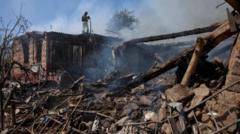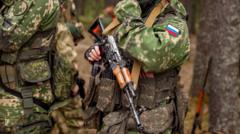Following a tumultuous civil war, President Al-Shara's approach to governance in Syria is crucial for national stability and international relations.
Syria's New Era: President Al-Shara's Bid for Global Support

Syria's New Era: President Al-Shara's Bid for Global Support
In a significant pivot, Syria's newly appointed leader Ahmed al-Shara calls for international backing as he navigates the post-war landscape.
In a recent interview with The New York Times, Syrian President Ahmed al-Shara laid out his vision for a stable future amid a complex geopolitical environment. Rising from his history as a rebel leader, al-Shara faces the daunting task of unifying a country reeling from decades of conflict and finding support from an uncertain international community.
Since seizing power in December after the downfall of Bashar al-Assad, al-Shara's government finds itself in dire need of foreign alliances. "Support from the U.S. and our allies is not just a request; it's essential for our stability," he emphasized during the dialogue. The new president is advocating for the lifting of economic sanctions imposed by the West due to concerns surrounding his past ties to jihadist groups.
In addressing the international community, al-Shara explained, "A stable Syria is crucial for the entire Middle East. Instability here could ripple out and affect global peace." This appeal reflects his awareness of the significant challenges ahead as the nation struggles with economic desperation and the threat of renewed conflict.
In his push for foreign aid, he has mentioned potential military support from both Russia and Turkey, which could assist in rebuilding a national army capable of maintaining peace and security. Al-Shara's administration aims to reconstruct public services, requiring substantial financial resources to ensure governmental functionality.
As al-Shara maneuvers through this precarious landscape, his success hinges on his ability to transform former enemies into allies and forge a new identity for Syria that emphasizes stability and peace, rather than the sectarian divides of the past.




















